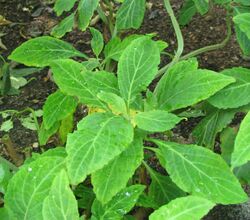Salvia divinorum
This article is a stub. As such, it may contain incomplete or wrong information. You can help by expanding it. |
| Salvia divinorum | |
|---|---|
|
S. divinorum in nature. |
|
| Taxonomical nomenclature | |
| Kingdom | Plantae |
| Unranked | Angiosperms |
| Unranked | Eudicots |
| Unranked | Asterids |
| Order | Lamiales |
| Family | Lamiaceae |
| Genus | Salvia |
| Species | S. divinorum |
| Common nomenclature | |
| Common names | Salvia, Sage of the Diviners, ska maría pastora, seer's sage, yerba de la pastora, Sally |
| Constituents | |
| Active constituents | Salvinorin A, Salvinorin B (in smaller quantities) |
A trip sitter is recommended with this substance that often is smoked in heavy doses. Short-acting intense trips may cause mental and physical side effects days after the hit has been taken. The overwhelming effects often require post-processing. It may take 2 days before physical side effects become noticeable, like shift in hearing. Using additional substances without a break (2 days + a few days to recover if you notice any side effects) increases the risk to get a bad post-trip. |
Salvia divinorum (also called Diviner's Sage, Ska María Pastora, Seer's Sage, and Salvia) is a psychoactive plant in the Salvia genus. Its native habitat is within Cloud Forest in the isolated Sierra Mazateca of Oaxaca, Mexico where it grows in shady and moist locations. The plant grows to over a meter high and has hollow square stems, large leaves, and occasional white flowers with violet calyxes. The main psychoactive compound in the plant is Salvinorin A, which can also be found in lower quantities in Salvia recognita and Salvia glutinosa.
A 2019 large-scale study found that ketamine, Salvia divinorum, and DMT (and other classical psychedelic substances) are linked to near-death experiences.[1]
People
Daniel Siebert has studied Salvia divinorum for over twenty years and was the first person to unequivocally identify (by human bioassays in 1993[2]) Salvinorin A as the primary psychoactive substance of Salvia divinorum.[3]
Gallery
External links
References
- ↑ Martial, C; Cassol, H; Charland-Verville, V; Pallavicini, C; Sanz, C; Zamberlan, F; Vivot, RM; Erowid, F; Erowid, E; Laureys, S; Greyson, B; Tagliazucchi, E (March 2019). "Neurochemical models of near-death experiences: A large-scale study based on the semantic similarity of written reports". Consciousness and cognition. 69: 52–69. doi:10.1016/j.concog.2019.01.011. PMID 30711788.
- ↑ "Ska Pastora -- Leaves of the Sherpherdess" (Conference at Breitenbush Hot Springs, by Ian Soutar). MAPS: Multidisciplinary Association for Psychedelic Studies. 2000-12-07. Retrieved 2009-10-09.
- ↑ Marushia, Robin (June 2003). "Salvia divinorum: The Botany, Ethnobotany, Biochemistry and Future of a Mexican Mint" (PDF). Ethnobotany. Archived from the original (PDF) on October 7, 2007. Retrieved 2007-05-04.
